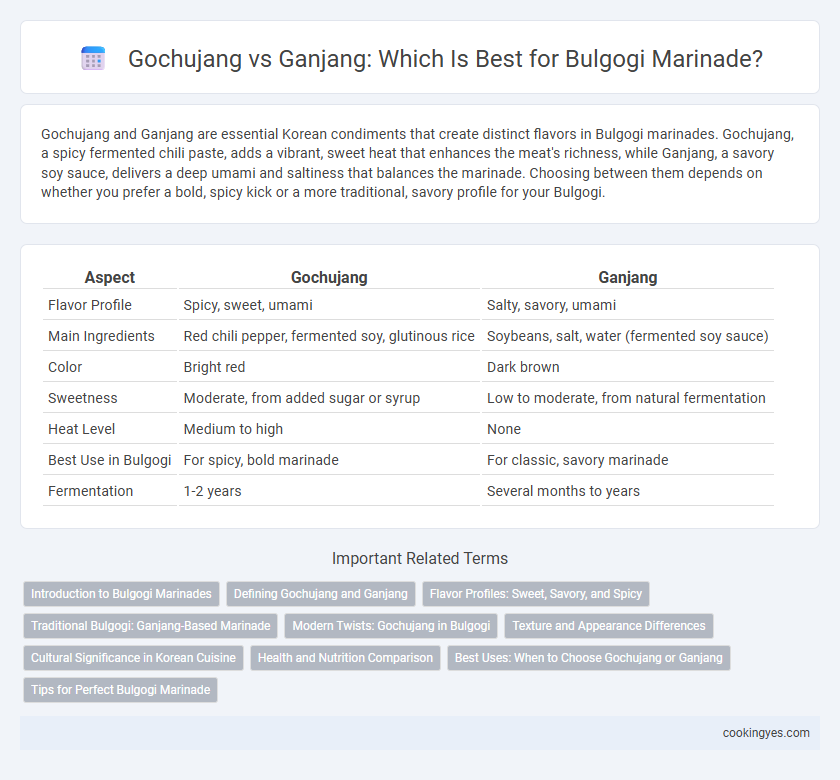Gochujang and Ganjang are essential Korean condiments that create distinct flavors in Bulgogi marinades. Gochujang, a spicy fermented chili paste, adds a vibrant, sweet heat that enhances the meat's richness, while Ganjang, a savory soy sauce, delivers a deep umami and saltiness that balances the marinade. Choosing between them depends on whether you prefer a bold, spicy kick or a more traditional, savory profile for your Bulgogi.
Table of Comparison
| Aspect | Gochujang | Ganjang |
|---|---|---|
| Flavor Profile | Spicy, sweet, umami | Salty, savory, umami |
| Main Ingredients | Red chili pepper, fermented soy, glutinous rice | Soybeans, salt, water (fermented soy sauce) |
| Color | Bright red | Dark brown |
| Sweetness | Moderate, from added sugar or syrup | Low to moderate, from natural fermentation |
| Heat Level | Medium to high | None |
| Best Use in Bulgogi | For spicy, bold marinade | For classic, savory marinade |
| Fermentation | 1-2 years | Several months to years |
Introduction to Bulgogi Marinades
Bulgogi marinades typically use ganjang, a traditional Korean soy sauce, to create a savory and slightly sweet flavor that penetrates the thinly sliced beef, enhancing its natural taste. Gochujang, a fermented red chili paste, introduces a spicy and tangy dimension to the marinade, making it less common but increasingly popular for those seeking a bolder, more complex flavor profile. Choosing ganjang maintains authenticity and balance in classic bulgogi, while gochujang offers a modern twist with added depth and heat.
Defining Gochujang and Ganjang
Gochujang is a fermented red chili paste that brings a spicy, sweet, and savory depth to Bulgogi marinades, enhancing the dish with vibrant umami flavors. Ganjang, on the other hand, is traditional Korean soy sauce that imparts a salty, slightly sweet profile, emphasizing the meat's natural flavors without overt spiciness. Choosing between Gochujang and Ganjang for Bulgogi marinade depends on the desired taste complexity and heat level, with Gochujang delivering bold spice and sweetness, while Ganjang offers subtle, rich saltiness.
Flavor Profiles: Sweet, Savory, and Spicy
Gochujang adds a bold, spicy heat and subtle sweetness to bulgogi, creating a rich, complex flavor profile with a fermented depth. Ganjang, or Korean soy sauce, delivers a savory, umami-rich base with a salty balance that highlights the meat's natural flavors without overpowering them. Combining both can yield a harmonious mix of sweet, spicy, and savory notes ideal for a well-rounded bulgogi marinade.
Traditional Bulgogi: Ganjang-Based Marinade
Traditional Bulgogi marinade relies on ganjang, a Korean soy sauce, which provides a savory and slightly salty flavor that enhances the natural taste of the beef without overpowering it. Unlike gochujang, a spicy fermented red chili paste, ganjang-based marinades offer a subtle umami depth essential to the classic Bulgogi profile. This soy sauce foundation balances sweetness from sugar or pear juice, creating a harmonious blend that tenderizes the meat while maintaining its authentic flavor.
Modern Twists: Gochujang in Bulgogi
Using gochujang in Bulgogi marinades introduces a bold, spicy depth that contrasts the traditional sweet and savory notes derived from ganjang (soy sauce). This modern twist enhances the umami with fermented chili paste's rich, complex flavors and a hint of heat, appealing to contemporary palates seeking vibrant Korean barbecue experiences. Gochujang's versatility also allows for balanced sweetness and fermented tang, making it a popular choice in innovative Bulgogi recipes that blend tradition with creative culinary flair.
Texture and Appearance Differences
Gochujang-based Bulgogi marinade produces a thicker, sticky texture with a vibrant red hue that adds a bold visual appeal and a slightly sweet, spicy flavor profile. Ganjang-based marinade results in a thinner, more liquid consistency with a darker, glossy appearance, emphasizing a savory, umami-rich taste that allows the meat's natural texture to stand out. The choice between gochujang and ganjang directly influences the Bulgogi's mouthfeel and color intensity, shaping the dish's overall sensory experience.
Cultural Significance in Korean Cuisine
Gochujang and Ganjang hold distinct cultural significance in Korean cuisine, especially when used in Bulgogi marinades. Gochujang, a fermented red chili paste, imparts a rich, sweet-spicy flavor that reflects Korea's historical emphasis on bold, vibrant tastes in traditional dishes. Ganjang, or soy sauce, contributes a savory umami depth rooted in Korean culinary heritage, highlighting the balance of salty and sweet flavors that define classic Bulgogi.
Health and Nutrition Comparison
Gochujang and Ganjang used in bulgogi marinades offer distinct nutritional profiles, with gochujang providing beneficial probiotics and antioxidants from fermented chili paste, while ganjang delivers lower calories and sodium depending on variety, such as low-sodium soy sauce options. Gochujang typically contains sugars and carbohydrates, contributing to energy intake, whereas ganjang is rich in amino acids that enhance flavor without added sugars. Choosing ganjang supports lower sugar consumption and promotes amino acid intake, whereas gochujang supports digestive health and antioxidant benefits from its fermentation process.
Best Uses: When to Choose Gochujang or Ganjang
Gochujang, a spicy and slightly sweet fermented chili paste, is best used in Bulgogi marinades when aiming for a bold, complex flavor with heat and depth, ideal for Korean BBQ variations that emphasize spice. Ganjang, a savory soy sauce-based marinade, suits traditional Bulgogi recipes focusing on umami and balance, enhancing the natural sweetness of beef without overpowering it. Choose Gochujang for a vibrant, spicy twist and Ganjang for a classic, mellow, and richly savory Bulgogi experience.
Tips for Perfect Bulgogi Marinade
Using gochujang in bulgogi marinade adds a rich, spicy depth with fermented chili flavors, perfect for those who enjoy a bold and slightly sweet heat. Ganjang, or Korean soy sauce, delivers a savory, umami-rich base that enhances the beef's natural taste without overpowering it, ideal for traditional, mild marinades. For the perfect bulgogi marinade, balance the sweetness, saltiness, and acidity by combining ganjang with a small amount of gochujang, sugar, garlic, and sesame oil to create a harmonious, flavorful profile.
Gochujang vs Ganjang for Bulgogi marinade Infographic

 cookingyes.com
cookingyes.com